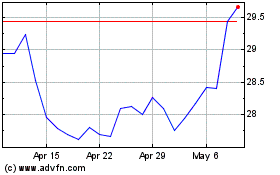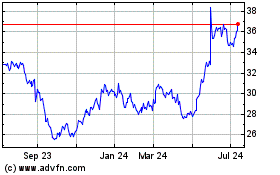First Patent Exchange To Launch Early Next Year
December 14 2009 - 8:30AM
Dow Jones News
The first financial exchange to sell patent-licensing rights,
poised to launch early next year, is being greeted by both optimism
and concern.
Many in the patent industry are skeptical of the still nascent
Intellectual Property Exchange International, worried that its
transactions will generate ripples of litigation. But others said
the new Chicago-based exchange could provide the transparency and
liquidity the patent licensing market has been missing.
On the electronic exchange, patent owners would essentially rent
out their licensing rights. In return for a share of the revenues,
the exchange's staff will promote the patent and sell the license
rights in individual units issued like stocks. It will also enforce
its protections with litigation when necessary. All sales and price
data will be published online.
"It's like an initial public offering for a patent," said Jim
Malackowski, chief executive of Ocean Tomo, the Chicago-based
merchant bank backing the exchange. Gerard Pannekoek, president of
the Chicago Climate Exchange until 2005, was named CEO of the
patent exchange on Friday.
The exchange has soft commitments from four or five companies
interested in formally joining and expects to have between 10 and
15 "industry leaders" pledged by February, Pannekoek said.
Spokesmen from Microsoft Corp. (MSFT), International Business
Machines Corp. (IBM) and Hewlett-Packard Co. (HPQ) declined to
comment.
The exchange could provide great insight into the often murky
world of patents, one leading expert said. "People will be
following it very closely," said Q. Todd Dickinson, former chief
intellectual property counsel at General Electric Co. (GE) and
director of the U.S. Patent and Trademark Office during the Clinton
administration.
Executives at Ocean Tomo, who value companies based on their
intellectual property, said their goal is to create an efficient
and transparent patent licensing marketplace. In time the exchange
may expand to sell the license rights as securities that could be
traded on a secondary market.
Traditionally, companies hoping to license out patents do so in
secret, labor-intensive and expensive deals that can be hard to
value properly.
"Any time that you are in a bilateral agreement with another
party you never know whether you got a great deal," Pannekoek said.
"An exchange will offer that price transparency to the market and
ultimately establish the real value of a patent."
Many in the patent industry are nervous that the exchange could
abuse its right to enforce patents against infringements. They
worry the exchange would use lawsuits to pursue profit off its
accumulated portfolio.
"Whenever anybody aggregates patents, there's always that
suspicion," said Patrick Thomas, principal at 1790 Capital, a hedge
fund that invests in companies based on their intellectual
property. But Thomas said Ocean Tomo's current business based on
valuing companies' patent assets lends credence to the new
venture.
David Silverman, the exchange's chief operating officer,
stressed that the company planned to make its money off transaction
fees, not through windfall lawsuit profits.
"What we're interested in doing with enforcement is making sure
everyone using the technology is paying their fair share,"
Silverman said.
Industry insiders said that while the idea of brokering patent
licensing rights is not new, standardizing a method of valuing
intellectual property would be a major breakthrough.
Determining the real value of a patent is notoriously difficult,
not least because major corporations typically use customized
contracts and are often reluctant to disclose the terms of any
deals made. Some predicted the exchange may end up most useful for
small companies or universities without the means to promote or
enforce patents on their own.
"It's really a very interesting and creative model," said Ron
Laurie, managing director of Inflexion Point, an IP-oriented
investment bank in Palo Alto, Calif. But he didn't know if the
exchange would be able to make standardized contracts the new
norm.
"It's too early to tell," he said.
-By Kristina Peterson, Dow Jones Newswires; 212-416-2917;
kristina.peterson@dowjones.com
HP (NYSE:HPQ)
Historical Stock Chart
From Mar 2024 to Apr 2024

HP (NYSE:HPQ)
Historical Stock Chart
From Apr 2023 to Apr 2024
